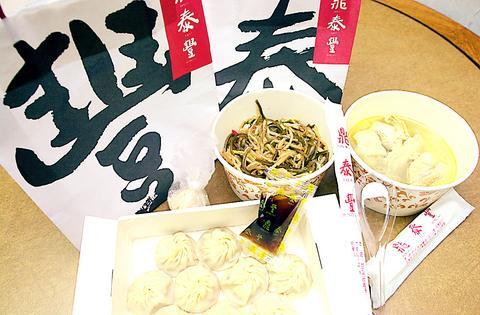At 6pm, the famous line of customers was not beginning to back up through the kitchen as it normally does. Due to SARS, the food and beverage business is slower all over town, even at Taipei's most famous restaurant, the dumpling shop Din Tai Fung.
But in many ways, the slowdown also has something to do with the fame. Din Tai Fung has in recent years generated much of its business from tourists, with Japanese tourists alone making up one-third of the clientele, according to employee of 13 years Wu Chia-feng (

PHOTO: GEORGE TSORNG, TAIPEI TIMES
"There are fewer tourists," said Wu, adding, "Taiwanese customers don't like to line up. But more people are taking out."
The restaurant started out more than 40 years ago as a street stall selling steamed dumplings and 30 years ago it moved to its present location. The kitchen was put at the entrance, forcing customers to file past white aproned cooks on the way to upper floor dining rooms, a feature that has since become a hallmark.
In 1993 the New York Times named Din Tai Fung one of the world's ten best restaurants, and the decade since has seen expansion, with six franchises added in Japan and one each in Shanghai, Hong Kong and Arcadia, California. Ordering and seating systems are computerized and there is now a Web site.
For many locals, growth has changed the restaurant. "Ding Tai Fung isn't what it used to be," said a woman who works in the area identifying herself as Ms. Huang. "It's really expensive. The price is fine for Japanese, but I think the food is better and cheaper at Kao Chi or Chinchiyuan."
Kao Chi, or Kao's Snack Collection (高記), and Chinchiyuan (金雞園), which are both within two or three minutes walk of Din Tai Fung, have similar menus of very good food, and are definitely cheaper (hsiaolungbao start at NT$100 at Kao's and NT$70 at Chinchiuan, compared to NT$170 at Din Tai Fung).
If you don't want to eat out, like many people recently, the entire menu is also available for take away. There is no delivery, but you can call ahead and your order will be ready in about fifteen minutes.

This month the government ordered a one-year block of Xiaohongshu (小紅書) or Rednote, a Chinese social media platform with more than 3 million users in Taiwan. The government pointed to widespread fraud activity on the platform, along with cybersecurity failures. Officials said that they had reached out to the company and asked it to change. However, they received no response. The pro-China parties, the Chinese Nationalist Party (KMT) and Taiwan People’s Party (TPP), immediately swung into action, denouncing the ban as an attack on free speech. This “free speech” claim was then echoed by the People’s Republic of China (PRC),

Exceptions to the rule are sometimes revealing. For a brief few years, there was an emerging ideological split between the Democratic Progressive Party (DPP) and Chinese Nationalist Party (KMT) that appeared to be pushing the DPP in a direction that would be considered more liberal, and the KMT more conservative. In the previous column, “The KMT-DPP’s bureaucrat-led developmental state” (Dec. 11, page 12), we examined how Taiwan’s democratic system developed, and how both the two main parties largely accepted a similar consensus on how Taiwan should be run domestically and did not split along the left-right lines more familiar in

Specialty sandwiches loaded with the contents of an entire charcuterie board, overflowing with sauces, creams and all manner of creative add-ons, is perhaps one of the biggest global food trends of this year. From London to New York, lines form down the block for mortadella, burrata, pistachio and more stuffed between slices of fresh sourdough, rye or focaccia. To try the trend in Taipei, Munchies Mafia is for sure the spot — could this be the best sandwich in town? Carlos from Spain and Sergio from Mexico opened this spot just seven months ago. The two met working in the

Many people in Taiwan first learned about universal basic income (UBI) — the idea that the government should provide regular, no-strings-attached payments to each citizen — in 2019. While seeking the Democratic nomination for the 2020 US presidential election, Andrew Yang, a politician of Taiwanese descent, said that, if elected, he’d institute a UBI of US$1,000 per month to “get the economic boot off of people’s throats, allowing them to lift their heads up, breathe, and get excited for the future.” His campaign petered out, but the concept of UBI hasn’t gone away. Throughout the industrialized world, there are fears that